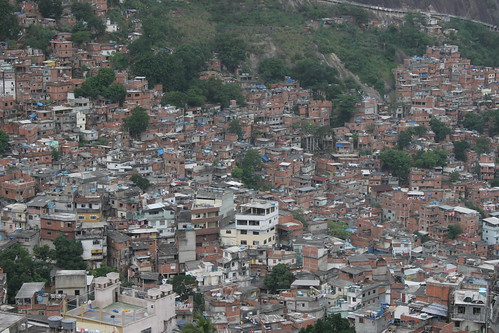The best 'touristy' thing I´ve done by far is take a favela tour - www.favelatour.com.br. No I´m not their new PR person but it´s a real eye-opener to how 20% of Rio´s population live. Most of the city people are afraid of the favelas. If you´ve seen ´City of God´ you´ll know why - it´s apparently an accurate depiction of life in a Rio slum. The tour aims to demystify what goes on inside and try to bridge the gap between the rich and the poor by educating both sides. They also give 50% of the proceeds to a school in the favela.
The oddest thing about Rio is that some of the most expensive houses are right opposite favelas so they literally live across the road from each other. Admittedly most have electric fences or have taken other security measures, but not all. I´m told that once inside the favela, tourists and city locals would be safe as the drug lord (!) of each favela would not permit robberies or violence as this would attract police interference. Outside the favela (in the city) you´re much more likely to get mugged. Good to know.
There is a hierarchy of people working for the drug lords including young boys who earn twice as much as the minimum wage. These younger boys tend to be lookouts at strategic points in the favelas and when they see police approaching, they´ll set off fireworks to warn everyone. This is the time to leave the favela if you don´t live there. Incidentally the average life expectancy of a drug lord is 25-30 years.
There are 752 favelas or slums in Rio - the largest is Rocinha - which has an estimated 130,000 people (60,000 officially). It´s a city within a city and totally self-sufficient with it´s own transport network, schools and hairdressers. As we drove up the narrow streets which were paved in Rocinha by the way, I saw a lady in a beauty salon having a pedicure.
It´s not quite what I imagined a Rio slum to look like - most houses were made of brick, had running water, an electricity supply they´d tapped into albeit illegally (hence the thousands of cables precariously suspended above the streets) and widescreen TVs! Apparently one thing both poor and rich have in common is Brazilian soap operas. I´m assured though not all favelas are as developed as Rocinha.
Saturday, October 07, 2006
City of God, Rio de Janeiro
Subscribe to:
Post Comments (Atom)

1 comment:
Hello,
I'm a student from Brazil and I'm working on a research project about favela tours. We're now working on the tourists's perceptions about tourism in Rocinha and were wondering if you would like to articipate as an interviewer. We could send you the questions (about 15) by email and would appreciate it if you could get back to us with any suggestions you find useful.
Thank you for your attention,
Palloma
pallomamenezes@hotmail.com
Post a Comment